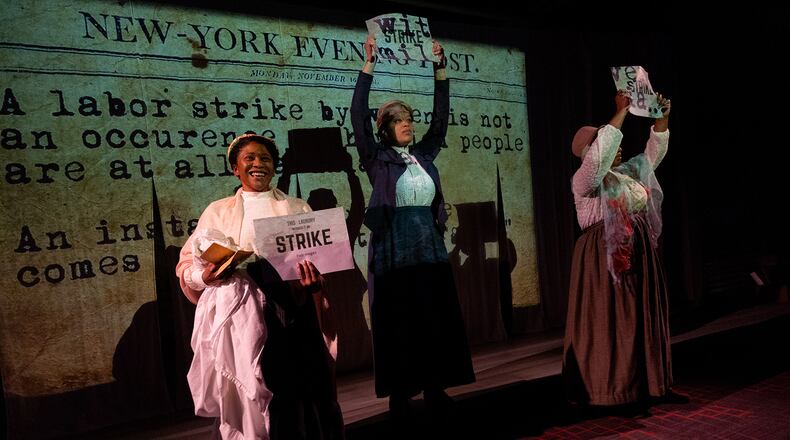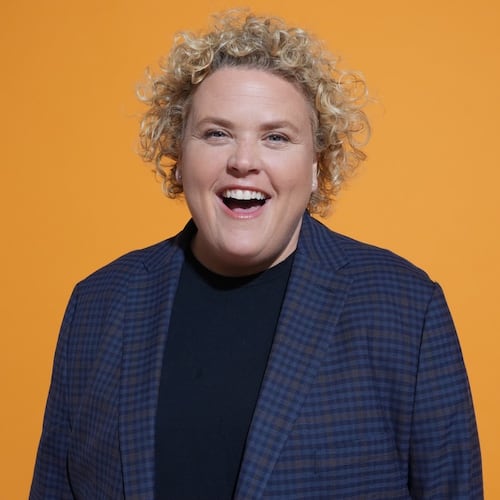In the house where Kelundra Smith grew up hangs a framed 1901 map of Wilkes County, where some of her ancestors were enslaved.
Displayed nearby are family photos, some sepia and creased from handling over the years, including her grandmothers Anna Lou Daniel-Wooden and Bertha Thomasine Adams-Smith.
“Because African Americans have a very painful history in this country, a lot of people have taken the approach of not liking to talk about what was,” says Smith.
“But on both sides of my family, people talk about what has happened. What we survived, what we experienced. It gives us a way of being rooted. We know we are resilient,” she continues, lingering by the wall of photos and explaining who’s who.
Smith has honored her grandmothers, and other women in her family tree, by lending their names to fictional characters in her new play “The Wash,” a 2024 selection of the prestigious National New Play Network Rolling World Premiere program.
Credit: Arvin Temkar/AJC
Credit: Arvin Temkar/AJC
The comedy/drama, about a real labor strike by Atlanta washerwomen in 1881, just completed a June run at Synchronicity Theatre, and has moved to Impact Theatre in Hapeville where it runs through July 28 with the same cast. As part of the new play project, it will play at theaters in St. Louis and Chicago in 2025.
“With ‘The Wash,’ you’ve got a play that thematically is fascinating and tells a story that most people don’t know,” says Nan Barnett, executive director of the National New Play Network. “But it’s a story that’s very relevant today. And I think that’s something that really speaks to people.”
“The Wash” is part of Smith’s “Reconstruction Trilogy,” three plays set from 1865-1881 that are based on historical fact but are mainly her own inventions. It’s the first of the three to be produced.
Smith titled “The Wash” after the adage “what doesn’t come out in the wash comes out in the rinse.”
“I believe that in the 21st century, we are living in the rinse — the unfinished business of the Reconstruction era,” she writes in the program notes.
“Growing up there weren’t a lot of people of color in our history books,” she explains. “But I’m here so I know somebody was here before. But who were they?”
She moves to the screened back porch of the house where she lived as a teenager in a quiet Gwinnett suburb near Loganville; birdsong filters in from the backyard as she relaxes barefoot, in jeans and a white blouse.
“One of the ways that oppression works is that it keeps you thinking you’re constantly having to start over,” she continues.
“For African Americans there’s this feeling that we have to start from scratch. By telling these stories, it shows that actually there’s a foundation here, there’s ground that’s been laid. You don’t always have to start from scratch.”
Kelundra Smith’s start was 34 years ago when her father Ray, a salesman, combined parts of three cousins’ names to create a new, unique one just for her. (Her mother Constance is a social work professor at University of Georgia.)
A native Atlantan, she grew up in the DeKalb County part of Stone Mountain, then moved to Gwinnett County as a teen and attended South Gwinnett High School.
She was an imaginative child, she says, who drew on her walls, made up stories with her Barbies and got in trouble for talking too much in class. She found a book of Maya Angelou’s poems when she was 10 and decided to write her own poems, using multicolor gel pens.
When she transferred to her new high school she got involved in theater as a way to make friends, and then got into drama club and speech competitions, but still had no intention of being a playwright.
When she graduated high school, her goal was to be editor of Seventeen magazine. When she recalls this, she bursts into a deep, hearty laugh, something she does with regularity.
With that goal in mind, she majored in journalism at the University of Georgia, then added a second major in theater. She got her master’s degree in arts administration at Syracuse University and worked in public relations and marketing until she decided that was not for her, “I don’t have enough of an attachment to money to be motivated by it,” she says.
Turning back to journalism, she wrote theater reviews for The Atlanta Journal-Constitution and the website ArtsATL and then established a successful freelance writing career with bylines in The New York Times, Food & Wine magazine and the Bitter Southerner.
On assignment in 2017, she saw a display at the National Museum of African American History and Culture in Washington, D.C., about the 1881 Atlanta washerwomen strike, a rare success story for Blacks and organized labor for that era.
Credit: Casey Gardner Ford
Credit: Casey Gardner Ford
Fascinated by this little-known event, she dug deeper, reading Tera Hunter’s book about the strike, “‘To Joy My Freedom: Southern Black Women’s Lives and Labors after the Civil War,” and newspaper accounts from the period.
She turned in the assignment.
“I thought I was done.”
She was not. Her head still abuzz with all that history, she was driving to her parents’ home soon after and a scene just popped into her head.
“I saw a woman with a shotgun in one hand and a lantern in the other, and she was in a nightgown, creeping around a corner because she thinks someone is in her house. But it’s her friend who is dropping rice and beans into jars because this is what they are going to have to split with the other women in their laundry co-op for their pay. And I heard their conversation as I’m driving.”
When she got home she sat down and wrote the first 35 pages of “The Wash” by hand.
“Not only is it historical, but it’s very much about the lived experiences of the washerwomen,” says Amina McIntyre, co-founder of Hush Harbor Lab, an Atlanta-based new play development company that worked with Smith to develop “The Wash.”
“She has brought in their lived experiences, their humor, their life, their joy, their losses and the particular pains and issues that they face.”
Since then, Smith has been a whirlwind of artistic creation. In addition to the Reconstruction Trilogy, she wrote “Other Paths to God,” which she calls a “mystery/dark comedy.” It grew out of conversations with nurses at Grady Memorial Hospital as part of Horizon Theatre’s Black Women Speak initiative, which aims to commission and stage new plays by Black women.
“One of the obstacles for playwrights is always telling stories that are of interest to you, but are they of interest to others?” says Lisa Adler, artistic director at Horizon. So, during the pandemic, the theater convened Zoom meetings between Black playwrights and members of the community to talk about issues and concerns as possible fodder for new plays, “to try to get the zeitgeist of what was going on in people’s lives,” she says.
“Other Paths to God” came as a result of those conversations.
“She’s a very, very talented, motivated writer,” Adler adds.
In 2023, Smith was named managing editor of American Theatre magazine, where she had been a frequent contributor. As she has established herself both as a creator of her own works and a critic of others’, she has noticed the differences in how each comes out.
“Journalism and critical writing for me is like architecture, putting together a building. You’re constructing the review in your mind as you’re watching a play.
“Playwrighting doesn’t work that way for me,” she continues. “When I sit down to write a play, the story feels less in my control as a playwright than it does as a critic. Which is a great irony because most people think it’s the opposite.”
THEATER PREVIEW
“The Wash.” Through July 28. $27-$80. Impact Theatre, 599 N. Central Ave., Atlanta. 470-239-0620, impacttheatreatlanta.org.
About the Author
Keep Reading
The Latest
Featured



